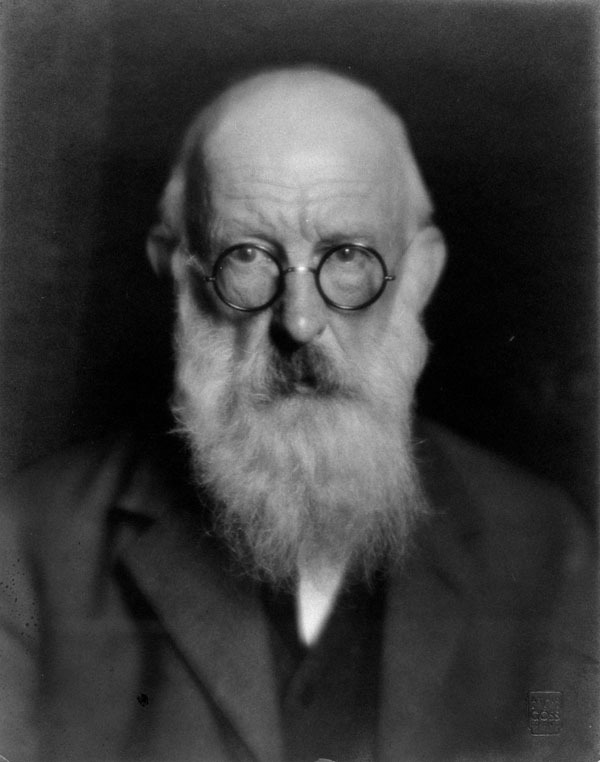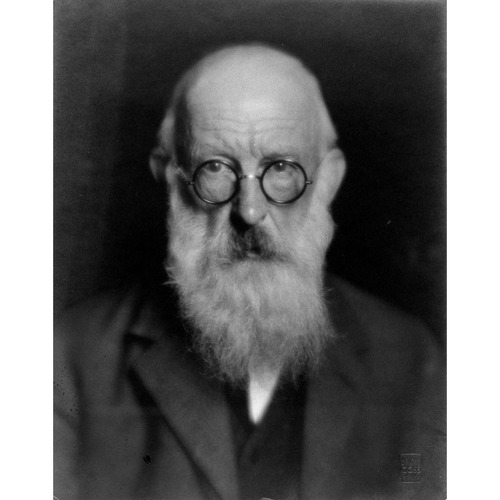MAVOR, JAMES, economist, professor, and author; b. 8 Dec. 1854 in Stranraer, Scotland, son of James Mavor, a Free Church minister and teacher, and Mary Ann Taylor Bridie; m. 16 Jan. 1883 Christina Jane Gordon Watt (d. 1934) in Glasgow, and they had two sons and two daughters, including Dora*; d. there 31 Oct. 1925.
The eldest surviving child in a large family, James Mavor was compelled to leave the High School of Glasgow at an early age. Apprenticed to a dry-salter in 1868, he undertook evening courses at the Andersonian Institution. In 1874 he began formal studies at the University of Glasgow, where he was influenced by idealist philosopher Edward Caird, but these ended in 1876, before a degree was awarded, because of a bout with typhoid fever. Mavor nonetheless forged an eclectic career for himself in Glasgow as a businessman, teacher, editor, and social reformer. He edited the short-lived Scottish Art Review (Glasgow; London) and was on the staff of the technologically oriented Industries (London). He also worked on behalf of the poor with the Kyrle Society and was a founding member of the Glasgow Workmen’s Dwellings Company Limited, which strove to provide affordable, sanitary housing for working people. Appointed lecturer in political economy and statistics at St Mungo’s College in Glasgow in 1888, he lectured as well at the Glasgow Athenaeum and in the extension programs of Edinburgh and Glasgow universities; he also delivered popular courses on political science to various organizations. Mavor quickly gained a reputation as an authority on forms of social and industrial organization.
Looking for a more critical approach to explain the destructive effects of industrialization and urbanization on Glasgow’s poor, Mavor actively participated in a number of socialist organizations including the Fabian Society, the Social Democratic Federation, and the Socialist League. He became acquainted with some of the key figures in the socialist scene in England and Scotland in the late 19th century, among them George Bernard Shaw, Sidney and Beatrice Webb, Patrick Geddes, and William Morris. In his 1898 play Candida, Shaw named one of the lead characters James Mavor Morell in his honour. Ultimately, however, the authoritarian tendencies of socialist leaders and his own conventional approach to economics led him to reject the Marxian theory of value and the effectiveness of socialist analyses of contemporary problems.
In 1892, on the recommendation of William James Ashley, the first professor of political economy at the University of Toronto, Mavor was appointed to succeed him as chair of the political science department, a position he would occupy until his retirement in 1923. He continued the department’s emphasis on empirical research into existing conditions, believing that political economy could provide contextual understandings to further social progress. During his tenure he was instrumental in shaping the department into its modern form, in the process initiating distinct streams of study in commerce and finance, and providing the intellectual climate for such future disciplines as social work and sociology. The department trained leaders for positions in government, business, and philanthropic initiatives; among a number of prominent graduates were Samuel Morley Wickett*, a pioneer in Canadian urban studies, and Robert Hamilton Coats*, the first dominion statistician. Mavor began the trend within universities of social science researchers contracting their services to governments and outside agencies. For example, in 1899 he was asked by Clifton Sifton, minister of the interior, to inquire into the progress of the settlement of Russian Doukhobors in western Canada. The previous year, at the request of his friend Prince Kropotkin, Mavor had persuaded Sifton to allow the Doukhobors to immigrate, and he would remain their staunch supporter, developing friendships with Count Tolstoy and Peter Vasil’evich Verigin, their spiritual leader. In 1899 as well he prepared a report for Sifton on potential European immigration to Canada. Mavor’s most controversial study was that commissioned by the British Board of Trade in 1903 on the settlement and economic prospects of the Canadian west; his conclusion that Canada could not fully supply Britain’s need for wheat in the immediate future was roundly condemned in both the British and the Canadian press. He subsequently devoted more time to his own wide-ranging research. In 1914 he published his most important study, the well-reviewed Economic history of Russia. Among his later works – a number hostile to public ownership – was Niagara in politics, an attack on Ontario Hydro and its chairman, Sir Adam Beck, that was paid for by private-power interests in the United States.
Mavor’s activities extended beyond academe. He fashioned himself as an aesthetic theorist, art historian, connoisseur, and patron of the arts (including literature and drama). Among those whose work he promoted were artists Homer Ransford Watson* and Horatio Walker* and writers Marjorie Lowry Christie Pickthall and Ernest Thompson Seton*. He became involved in many aspects of Toronto’s cultural and educational edification, working with Byron Edmund Walker and others to found the Art Museum of Toronto and the Royal Ontario Museum; he was also active in the city beautification initiatives of the Toronto Guild of Civic Art. Mavor lectured and wrote extensively on the potential of art, his work appearing in such important publications as the Year Book of Canadian Art and the Canadian Magazine, both of Toronto. Increasingly recognized as an authority, in 1897 (less than five years after his arrival) he was asked by John Castell Hopkins to write an article for his projected encyclopedia on “the Progress and Position of Art in Canada,” an essay that for whatever reason did not appear. In 1897 he organized local artists, among them George Agnew Reid* and his wife, Mary Augusta Catharine Hiester, to prepare sketches of the costumes worn at the Victorian Era Ball; these were published the following year in a commemorative volume.
Mavor’s impact on the university was controversial, for he was seen as an eccentric dabbler. As early as 1895 he was implicated in a student strike over favouritism in appointments and matters of discipline [see William Dale]; questions arose about the authenticity of his credentials, his rambling lecture style, and his general academic fitness. William Lyon Mackenzie King*, an undergraduate in the political science department and a leader of the strike, was particularly antagonistic towards Mavor, especially after King was denied a prestigious fellowship. Though many of these conflicts were rooted in university politics and personal relations, it is notable that Mavor’s detractors consistently fed the notion of “academic unsuitability” – a judgement drawing heavily on the professor’s unpopularity – by emphasizing his dual interests in what a Toronto Daily Star article of 7 Nov. 1925 termed “Bohemia . . . [and] Collegia.” His own disputatious attitude can be explained in part by his assessment of Toronto as a colonial backwater and its inhabitants as minor players of limited intellect. In the preface to his memoirs, My windows on the street of the world (2v., London and Toronto, 1923), Mavor would still refer to Toronto as the “New World.” Nevertheless, his achievements were recognized by the university, which granted him an honorary phd in 1912. In 1926 Oscar Pelham Edgar*, in a eulogy on behalf of the Royal Society of Canada, to which Mavor had been elected in 1914, neatly captured his contribution to academia: “No professor has ever done more towards enlarging the boundaries of University life and to relieve it from the imputation of cloistral aloofness and academic pedantry.”
Mavor died in Glasgow in 1925, en route to visit friends in Montpellier, France.
The largest collection of James Mavor’s papers is housed in the Univ. of Toronto Library, Thomas Fisher Rare Book Library, ms coll. 119 (James Mavor papers). Additional resources are located in LAC, MG 29, C16; UTA, A1967-0007 and A1976-0025, box 2, files 3, 7; the Mavor fonds in York Univ. Libraries, Arch. and Special Coll. (Toronto), F0351; and the Art Gallery of Toronto correspondence and other collections in the Art Gallery of Ontario, Research Library and Arch. (Toronto). A detailed listing of these and other primary materials relating to Mavor is provided in Guide to the papers of James Mavor, compiled by D. A. Signori for the Fisher Library in 1989.
Mavor was a prolific author. His books appear in the standard catalogues, but there is no complete bibliography of his articles. Many are noted in the Guide to his papers, which does not, however, provide publication information. Partial listings appear in Bowker and in Shortt, infra. Of the works mentioned in the text, An economic history of Russia was published in two volumes in London in 1914 (a second edition appeared in 1925 and was reprinted in New York in 1965); Niagara in politics: a critical account of the Ontario Hydro-Electric Commission was issued in New York in 1925; and Mavor’s North west of Canada: report to the Board of Trade on the north west of Canada, with special reference to wheat production for export was published as G.B., Parl., Command paper, 1905, 54, [C. 2628]. See also Book of the Victorian Era Ball, given at Toronto on the twenty eighth of December, MDCCCXCVII (Toronto, 1898). General Register Office for Scotland (Edinburgh), Kelvin (Glasgow), reg. of marriages, 16 Jan. 1883. A. F. Bowker, “Truly useful men: Maurice Hutton, George Wrong, James Mavor and the University of Toronto, 1880–1927” (phd thesis, Univ. of Toronto, 1975). Augustus Bridle, Sons of Canada: short studies of characteristic Canadians (Toronto, 1916). S. Z. Burke, Seeking the highest good: social service and gender at the University of Toronto, 1888–1937 (Toronto, 1996). Canadian men and women of the time (Morgan; 1898). I. M. Drummond, assisted by William Kaplan, Political economy at the University of Toronto: a history of the department, 1888–1982 (Toronto, 1983). [O. P. Edgar], “James Mavor,” RSC, Trans., 3rd ser., 20 (1926), proc.: xiii–xvi. J. B. Glasier, William Morris and the early days of the socialist movement; being reminiscences of Morris’ work as a propagandist . . . (London, 1921). James Mavor and his world: an exhibition of books and papers selected from the James Mavor collection, June–July 1975, comp. Rachel Grover and F. W. M. Moore (Toronto, 1975). J. M. Moore, “Why ‘James Mavor’ Morell?” Shaw Rev. (University Park, Pa), 23 (1980): 48–51. Mavor Moore, Reinventing myself: memoirs (Toronto, 1994). E. L. Panayotidis, “James Mavor: cultural ambassador and aesthetic educator to Toronto’s élite,” Journal of Pre-Raphaelite Studies (Tempe, Ariz.), new ser., 6/7 (fall/spring 1997/98): 161–73. R. [M.] Pepall, “Under the spell of Morris: a Canadian perspective,” in The earthly paradise: arts and crafts by William Morris and his circle from Canadian collections, ed. K. A. Lochnan (Toronto, 1993), 19–35. S. E. D. Shortt, The search for an ideal: six Canadian intellectuals and their convictions in an age of transition, 1890–1930 (Toronto and Buffalo, N.Y., 1976).
Cite This Article
E. Lisa Panayotidis, “MAVOR, JAMES,” in Dictionary of Canadian Biography, vol. 15, University of Toronto/Université Laval, 2003–, accessed December 31, 2025, https://www.biographi.ca/en/bio/mavor_james_15E.html.
The citation above shows the format for footnotes and endnotes according to the Chicago manual of style (16th edition). Information to be used in other citation formats:
| Permalink: | https://www.biographi.ca/en/bio/mavor_james_15E.html |
| Author of Article: | E. Lisa Panayotidis |
| Title of Article: | MAVOR, JAMES |
| Publication Name: | Dictionary of Canadian Biography, vol. 15 |
| Publisher: | University of Toronto/Université Laval |
| Year of publication: | 2005 |
| Year of revision: | 2005 |
| Access Date: | December 31, 2025 |




